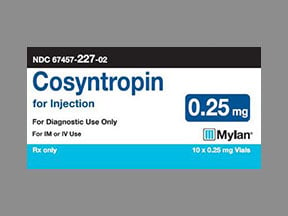
Cosyntropin Coupons & Savings Card – Discount Prices from $24.82
Generic for: Cortrosyn
My prescription
Edit
0.25MG, Cosyntropin (1 Solution Reconstituted)
Select pharmacy

CVS
$81.94
COUPON PRICE
Albertsons
$24.82
COUPON PRICE
Walgreens
$32.44
COUPON PRICE
Walmart
$72.00
COUPON PRICECosyntropin savings card
Show this card to your pharmacist
Albertsons
$24.82
BIN
ID
PCN
GRP
019876
LH56A2186E
CHIPPO
LHX
Powered by
Price history for Cortrosyn (brand) & Cosyntropin (generic)
1 Solution Reconstituted, 0.25MG
Average retail price for Cortrosyn
Average retail price for Cosyntropin
Average SaveHealth price for Cosyntropin
Our price history data is based on aggregated prescription data collected from participating pharmacies in America. Our prescription data updates daily to reflect the latest price changes. If you notice a missing data point, it means there wasn't sufficient data available to generate a monetary value for that date.
We analyzed Cosyntropin prices for (0.25MG, 1 Solution Reconstituted) over the last 12 months. The average retail price was $577.24, while the average price using the SaveHealth discount card was $53.42. That's a savings of approximately 90.75% when using our Cosyntropin coupon.
Compared to the generic version, Cortrosyn had an average price of $153.55 over the same time period. With the SaveHealth savings card, Cosyntropin is 65.21% cheaper on average than Cortrosyn.
*Retail prices are based on pharmacy claims data, and may not be accurate when we don't have enough claims.
Cosyntropin dosage forms
Dosage Quantity Price from Per unit 0.25MG 1 Solution Reconstituted $24.82 $24.82 0.25MG 10 Solution Reconstituteds $180.73 $18.07
| Dosage | Quantity | Price from | Per unit |
|---|---|---|---|
| 0.25MG | 1 Solution Reconstituted | $24.82 | $24.82 |
| 0.25MG | 10 Solution Reconstituteds | $180.73 | $18.07 |
Cosyntropin Warnings
When considering the use of cosyntropin, it's important to be aware of certain risks associated with its administration. Individuals with a known hypersensitivity to cosyntropin or any of its components should not receive this medication, as severe allergic reactions, including anaphylaxis, have been reported. Patients with a history of asthma or other allergic conditions may be at a higher risk for such reactions.
Additionally, cosyntropin may not be suitable for individuals with certain health conditions. Caution is advised for patients with gastrointestinal diseases, cardiovascular issues, liver or kidney disorders, infections, myasthenia gravis, eye diseases, psychiatric conditions, osteoporosis, or thyroid disorders. In these cases, the use of cosyntropin should be carefully evaluated by a healthcare professional to ensure safety.
It's also important to note that cosyntropin can affect the accuracy of diagnostic tests for adrenal function. Certain medications, such as glucocorticoids, spironolactone, and estrogen-containing drugs, can interfere with test results. Therefore, it's essential to inform your healthcare provider about all medications you are currently taking before undergoing testing with cosyntropin.
In summary, while cosyntropin is a valuable tool in diagnosing adrenal insufficiency, it carries potential risks that require careful consideration. Always consult with your healthcare provider to determine if cosyntropin is appropriate for you, especially if you have existing health conditions or are taking other medications.
Cosyntropin Side Effects
Cosyntropin Interactions
When preparing for a cosyntropin test, it's important to be aware of certain medications that can affect the accuracy of the results. Glucocorticoids and Spironolactone may lead to falsely elevated cortisol levels. Therefore, it's recommended to discontinue these medications on the day of the test. In the case of long-acting glucocorticoids, a longer discontinuation period may be necessary. Additionally, estrogen-containing drugs can increase cortisol-binding globulin levels, potentially elevating plasma total cortisol levels. To ensure accurate test results, it's advisable to stop estrogen-containing medications four to six weeks prior to the test. If discontinuation isn't feasible, measuring cortisol-binding globulin levels during the test can help interpret the results accurately.
Cosyntropin can also enhance the electrolyte loss associated with diuretic therapy. This means that if you're taking diuretics, cosyntropin may increase the risk of electrolyte imbalances. It's important to inform your healthcare provider about all medications you're currently taking, including over-the-counter drugs and supplements, to ensure the cosyntropin test is both safe and effective.
